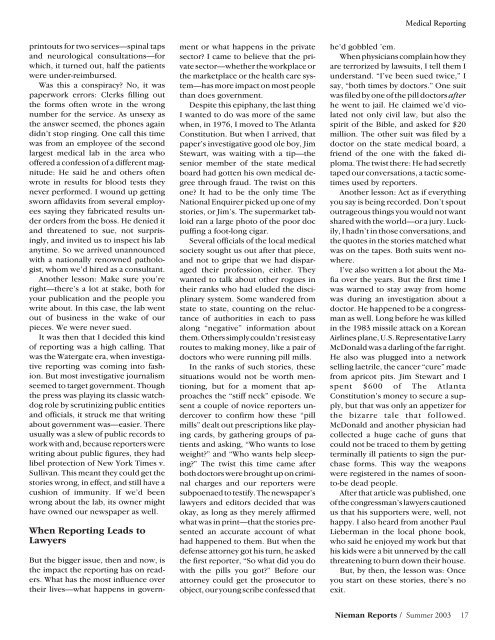summer-2003-Part 2-live - Nieman Foundation - Harvard University
summer-2003-Part 2-live - Nieman Foundation - Harvard University
summer-2003-Part 2-live - Nieman Foundation - Harvard University
- No tags were found...
Create successful ePaper yourself
Turn your PDF publications into a flip-book with our unique Google optimized e-Paper software.
Medical Reportingprintouts for two services—spinal tapsand neurological consultations—forwhich, it turned out, half the patientswere under-reimbursed.Was this a conspiracy? No, it waspaperwork errors: Clerks filling outthe forms often wrote in the wrongnumber for the service. As unsexy asthe answer seemed, the phones againdidn’t stop ringing. One call this timewas from an employee of the secondlargest medical lab in the area whooffered a confession of a different magnitude:He said he and others oftenwrote in results for blood tests theynever performed. I wound up gettingsworn affidavits from several employeessaying they fabricated results underorders from the boss. He denied itand threatened to sue, not surprisingly,and invited us to inspect his labanytime. So we arrived unannouncedwith a nationally renowned pathologist,whom we’d hired as a consultant.Another lesson: Make sure you’reright—there’s a lot at stake, both foryour publication and the people youwrite about. In this case, the lab wentout of business in the wake of ourpieces. We were never sued.It was then that I decided this kindof reporting was a high calling. Thatwas the Watergate era, when investigativereporting was coming into fashion.But most investigative journalismseemed to target government. Thoughthe press was playing its classic watchdogrole by scrutinizing public entitiesand officials, it struck me that writingabout government was—easier. Thereusually was a slew of public records towork with and, because reporters werewriting about public figures, they hadlibel protection of New York Times v.Sullivan. This meant they could get thestories wrong, in effect, and still have acushion of immunity. If we’d beenwrong about the lab, its owner mighthave owned our newspaper as well.When Reporting Leads toLawyersBut the bigger issue, then and now, isthe impact the reporting has on readers.What has the most influence overtheir <strong>live</strong>s—what happens in governmentor what happens in the privatesector? I came to believe that the privatesector—whether the workplace orthe marketplace or the health care system—hasmore impact on most peoplethan does government.Despite this epiphany, the last thingI wanted to do was more of the samewhen, in 1976, I moved to The AtlantaConstitution. But when I arrived, thatpaper’s investigative good ole boy, JimStewart, was waiting with a tip—thesenior member of the state medicalboard had gotten his own medical degreethrough fraud. The twist on thisone? It had to be the only time TheNational Enquirer picked up one of mystories, or Jim’s. The supermarket tabloidran a large photo of the poor docpuffing a foot-long cigar.Several officials of the local medicalsociety sought us out after that piece,and not to gripe that we had disparagedtheir profession, either. Theywanted to talk about other rogues intheir ranks who had eluded the disciplinarysystem. Some wandered fromstate to state, counting on the reluctanceof authorities in each to passalong “negative” information aboutthem. Others simply couldn’t resist easyroutes to making money, like a pair ofdoctors who were running pill mills.In the ranks of such stories, thesesituations would not be worth mentioning,but for a moment that approachesthe “stiff neck” episode. Wesent a couple of novice reporters undercoverto confirm how these “pillmills” dealt out prescriptions like playingcards, by gathering groups of patientsand asking, “Who wants to loseweight?” and “Who wants help sleeping?”The twist this time came afterboth doctors were brought up on criminalcharges and our reporters weresubpoenaed to testify. The newspaper’slawyers and editors decided that wasokay, as long as they merely affirmedwhat was in print—that the stories presentedan accurate account of whathad happened to them. But when thedefense attorney got his turn, he askedthe first reporter, “So what did you dowith the pills you got?” Before ourattorney could get the prosecutor toobject, our young scribe confessed thathe’d gobbled ’em.When physicians complain how theyare terrorized by lawsuits, I tell them Iunderstand. “I’ve been sued twice,” Isay, “both times by doctors.” One suitwas filed by one of the pill doctors afterhe went to jail. He claimed we’d violatednot only civil law, but also thespirit of the Bible, and asked for $20million. The other suit was filed by adoctor on the state medical board, afriend of the one with the faked diploma.The twist there: He had secretlytaped our conversations, a tactic sometimesused by reporters.Another lesson: Act as if everythingyou say is being recorded. Don’t spoutoutrageous things you would not wantshared with the world—or a jury. Luckily,I hadn’t in those conversations, andthe quotes in the stories matched whatwas on the tapes. Both suits went nowhere.I’ve also written a lot about the Mafiaover the years. But the first time Iwas warned to stay away from homewas during an investigation about adoctor. He happened to be a congressmanas well. Long before he was killedin the 1983 missile attack on a KoreanAirlines plane, U.S. Representative LarryMcDonald was a darling of the far right.He also was plugged into a networkselling laetrile, the cancer “cure” madefrom apricot pits. Jim Stewart and Ispent $600 of The AtlantaConstitution’s money to secure a supply,but that was only an appetizer forthe bizarre tale that followed.McDonald and another physician hadcollected a huge cache of guns thatcould not be traced to them by gettingterminally ill patients to sign the purchaseforms. This way the weaponswere registered in the names of soonto-bedead people.After that article was published, oneof the congressman’s lawyers cautionedus that his supporters were, well, nothappy. I also heard from another PaulLieberman in the local phone book,who said he enjoyed my work but thathis kids were a bit unnerved by the callthreatening to burn down their house.But, by then, the lesson was: Onceyou start on these stories, there’s noexit.<strong>Nieman</strong> Reports / Summer <strong>2003</strong> 17
















